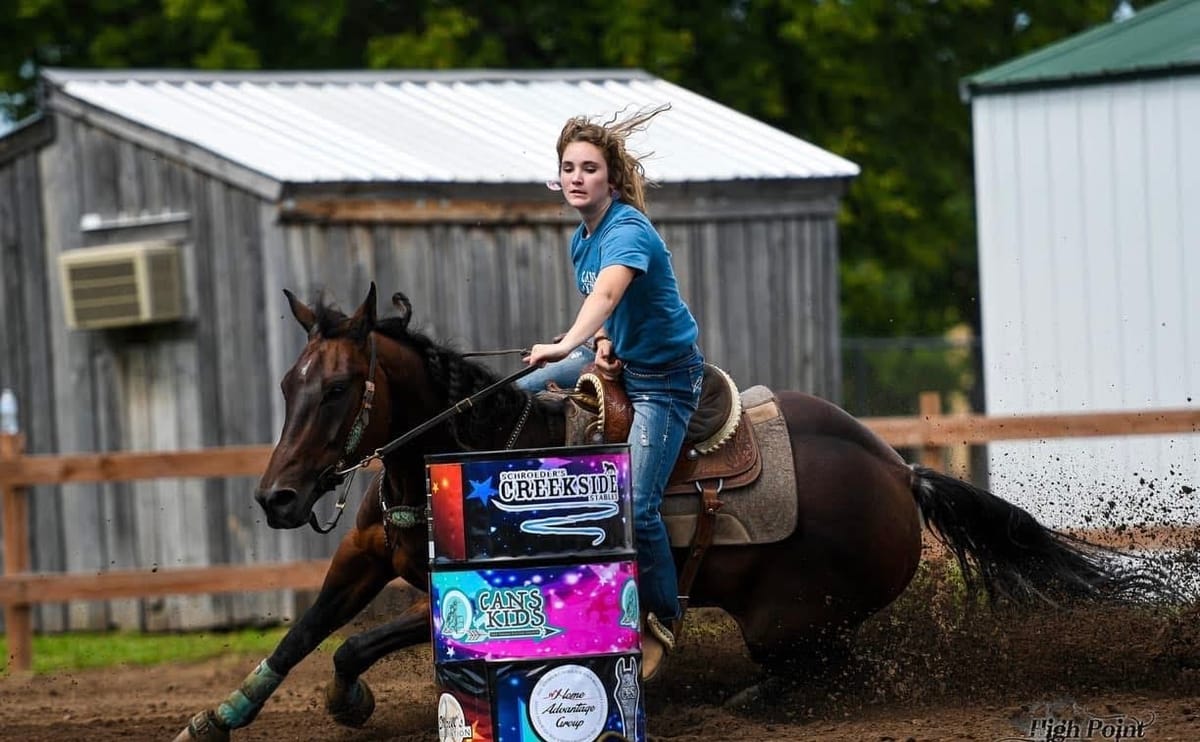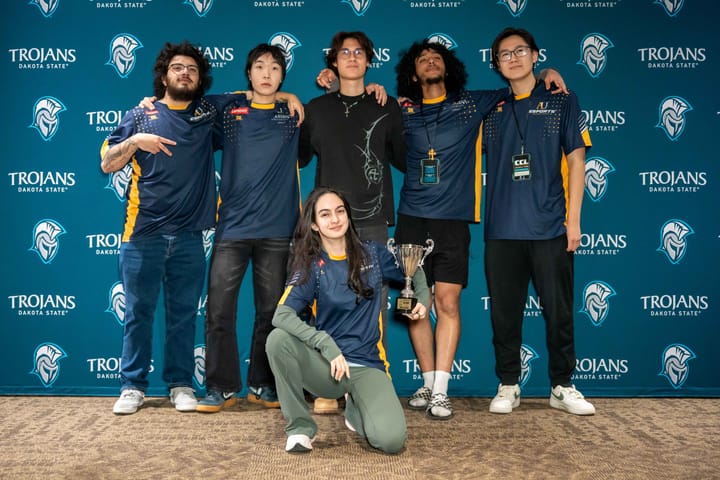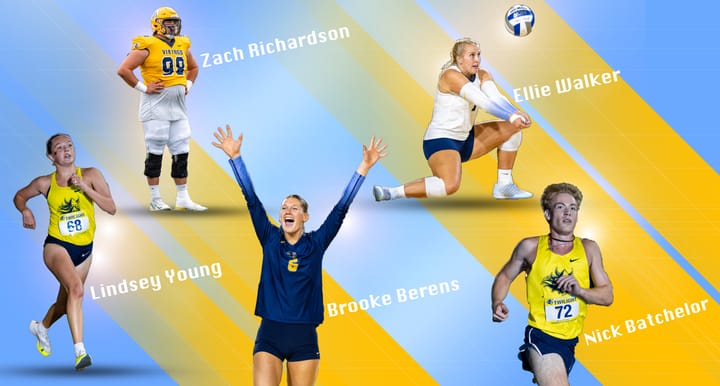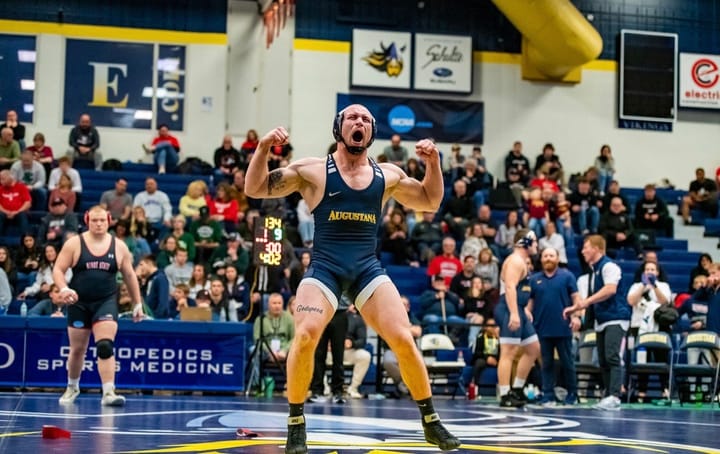From barrel runs to books

While most college juniors are hitting the books this fall, Myranda Griesert would rather be thundering down an area chute on her horse, rounding barrels in a cloud of dust.
Instead, she’s holed up in her room studying for the MCAT — a far cry from the rodeo arenas she grew up in.
Raised on an acreage outside of Princeton, Minnesota, Griesert spent her childhood in the saddle, surrounded by horses and a family steeped in rodeo tradition.
“My mom and dad actually met through the rodeo,” Griesert said. “I guess you could say it’s kind of in my blood.”
She tried various events growing up — poles, goat tying, even a bit of roping — but barrel racing was what stuck.
Barrel racing is a high-speed rodeo event where riders race around a cloverleaf pattern of barrels in the fastest time possible. Precision and trust between horse and rider are everything; a misplaced step can knock over a barrel or cost precious seconds.
“I tried goat tying for a bit, but neither that nor poles were really my jam,” she said. “I prefer to stay on the horse.”
That preference turned into passion. Griesert began racing competitively through the Minnesota Rodeo Association (MRA) and the Western Saddle Club Association, spending summers on the road with her family, chasing jackpots and daylight.
“We went to the MRA high school rodeo finals, the Minnesota State Fair and the champ show the week after — it was a circuit,” Griesert said. “We’d just cycle through that year after year, trying to do as much as we could.”
Despite her love for the sport, Griesert didn’t pursue rodeo at the collegiate level. South Dakota State had an equestrian program, but ultimately, she chose Augustana for its academics. She now studies biochemistry on the pre-med track.
College rodeo was technically an option. She could compete independently, but the cost and time commitment made it impractical.
“If I wanted to do that, I could,” Griesert explained. “I’d just have to get our dean to sign off on it. But it’s expensive. Your college doesn’t pay for your membership, your entry fees, your stalling. You cover everything.”
Still, rodeo never really left her. Back in Minnesota, a young colt was waiting.
“His name is Benny,” Griesert said, a smile stretching across her face. “He’s the only horse we’ve ever had born at our place — the mare I grew up riding. He’s really special to me.”
Benny was born in the spring of 2023 right before Griesert graduated high school. She’s been training him ever since, slowly introducing him to barrel racing, getting him comfortable in the arena.
Last spring, she boarded him at a family friend’s farm in Canton so she could work with him more regularly. This coming April, the two plan to compete in their first futurity — a race reserved for young, up-and-coming horses.
“I’m both excited and nervous about it,” Griesert said. “It will be fun to be up here on my own with him, bring my truck and trailer up and have him with me permanently. But it’ll definitely be different and a little scary.”
Griesert misses being around people who understand that world. At a school like Augustana where rodeo isn’t common conversation, she sometimes feels like an outsider.
“For me, rodeo has always been a hobby,” she said. “Like, I’ll live and die doing it. Being able to talk about it with people here is something I’ve always wanted.”
This year, she might get that chance.
Freshmen Addison Waldner and Raylynn Dehning arrived on campus with rodeo experience of their own. The trio hasn’t met yet, but all three women are part of a small but passionate group of riders keeping rodeo alive at Augustana.
Dehning, like Griesert, was raised in a rodeo family. Her dad rode bulls. Her mom grew up with horses on a ranch. Dehning has been running barrels since she was old enough to enter junior rodeos. By 2020, she’d placed third in the state for flag racing through the National Barrel Horse Association.
She still competes when she can, although college makes practicing harder.
“I’ll go home on the weekends to ride and prepare for the spring and summer competitions,” Dehning said. “I’m definitely hoping to keep rodeo up as a hobby while I’m at Augie. I love it too much to give up.”
Waldner’s story is a little different. She didn’t grow up with horses, but she always wanted one.
She started riding lessons at 12, begged her dad for a horse of her own and got her wish the following year: a gelding named Jinx. Soon, she and Jinx were running barrels together — and holding their own in local competitions.
“We mostly do small town competitions, usually at fairgrounds,” Waldner said. “But we’ve been to bigger [National Finals Rodeo] stuff a few times. Those are multiple-day things, usually in Rapid City or Lincoln.”
Like Griesert and Dehning, Waldner finds it strange that rodeo feels so foreign to her peers.
“It’s weird. Whenever I bring up horses and people are surprised by it, I’m surprised that they’re surprised,” Waldner said. “Nobody knows what a jackpot is, and things like that are such common knowledge to me and the people I grew up around.”
Together, the three riders are part of a quietly growing rodeo community — one that lives between classes, road trips home and dreams of dirt-covered arenas.
Whether it’s Dehning slipping home to ride, Waldner reminiscing about summer jackpots, or Griesert prepping Benny for his debut, their shared passion still finds a way to take the reins. They may not have an official team or university funding, but they’re doing what rodeo people have always done: making it work, one run at a time.



